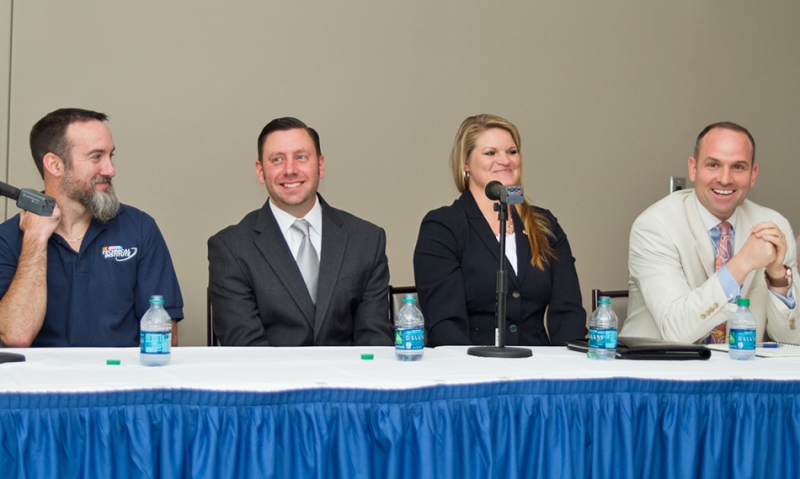
Veterans, higher education and government officials collaborate at the Legion’s Education Syposium during national convention.
Over the past five years, the Department of Veterans Affairs has issued $43.1 billion in Post-9/11 GI Bill benefits to more than 1.2 million veterans, said Robert Worley, director of education services at the VA, during The American Legion’s Education Symposium on Aug. 26.
Several of those student veterans were on hand at Queens University of Charlotte for the symposium, coordinated by the Legion's Veterans Employment & Education Division as part of the 96th National Convention in Charlotte, N.C. The group, which represented different colleges in North Carolina, shared their experiences of transitioning from the regimented world of the military to academic life.
Professors, members of academia, education advocates and officials from federal agencies. were all there to hear the group's thoughts and engage in dialogue with them.
“As a college administrator, we find that veterans in the classroom raise the bar. They keep the younger folks in the game when they are drifting off,” said Bob Larned, director of Military & Veterans Affairs at ECPI University in Charlotte. “The different maturity factor that veterans have and their life experiences really helps the learning environment for everybody. So it’s a wonderful thing when you have veterans to enhance a classroom.”
Lacy Evans, a Marine veteran, said she knew she wanted to attend college at the University of North Carolina at Chapel Hill because of the tough job market. To prepare herself for the transition, the first generation college student took courses at Marine Corps Base Camp Lejeune.
“Taking the courses at Camp Lejeune got me back in the swing of going to school and learning the higher education process,” Evans said. “I also have the attitude that you can’t really complain about something unless you are going to help make that change. I got involved with local veterans service organizations in the area and with UNC’s SVA (Student Veterans of America) chapter.”
There are many servicemembers who take college courses while on active-duty, like Evans did. Tom Langdon, director of State Liaison & Education Opportunity at the Department of Defense, said 285,000 active-duty military servicemembers took 850,000 courses in 2013 by using military tuition assistance. Also in 2013, nearly 56,000 active-duty servicemembers either earned a degree or a certificate.
The transition from military to student life was a little more difficult for Aaron Harper, a fifth generation Marine who received his undergraduate from North Carolina State and is currently pursuing an MBA at Queens University.
“As a Marine, you are so locked in with the other troops that you’re used to that camaraderie; you’re used to being able to lean on each other; you’re in it 24-7,” Harper said. “Then you’re in this student environment, and it’s tough to make that adjustment. It’s about being able to speak that same language in order to make the transition rather than going into the unknown. There’s not going to be that network that’s immediately right there for you until you seek it out.”
North Carolina State didn’t have an SVA chapter when Harper attended college there, but for Shasta Resper, an Army veteran attending college at Central Piedmont Community College in Charlotte, it was the SVA chapter that got her out of her comfort zone.
“The SVA chapter gave me a base and a foundation of what to be on campus. You become a leader and not someone who just wants to run home and take an online class,” Resper said. “My advice to all student veterans is to get connected immediately with veterans groups on campus.”
Air Force veteran Keith Jones said the military prepared him well for the transition to student life, but his biggest transition challenge at ECPI University in Charlotte was going from a structured environment to a “relaxed one where I didn’t have to get up at 5 a.m. to run and having everyone ask me how Iraq was,” he said. “I mentally prepared myself for the transition. I knew I was going to get out, and I knew I was going to start a new chapter in my life.”
When asked what colleges can do to help make civilian students more aware of student veterans, Resper said to host a roundtable discussion for students, faculty and community members to attend where student veterans share their military experiences. Evans said it would be a good idea to provide a special sash on graduation day for the veterans to wear that says they are a proud veteran of their specific branch.
The Department of Education and VA is helping colleges and universities support veterans as they pursue education with the voluntary initiative, 8 Keys to Veterans’ Success. There are currently 1,000 schools that have volunteered to adopt and implement these keys on their campus. Learn more about the initiative here.
Tanya Ang, director of American Council on Education, said all campuses should also talk to their student veterans and hear what they want. She said one campus built a veterans center and only three student veterans attended the grand opening because they never asked their students what they wanted. Come to find out, all they wanted was an extra person in the bursar’s office so they didn’t have to wait in line.
“It’s not always these big glorious programs that they want,” Ang said. “Sometimes it’s the smallest of things. And those smaller things organically grow into larger things that then build up community and then get involvement on the campus. Then the program grows to what the needs are of the students on campus.”
- Careers

